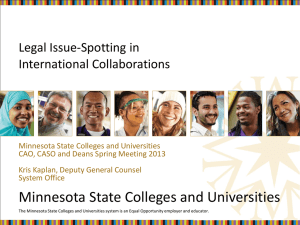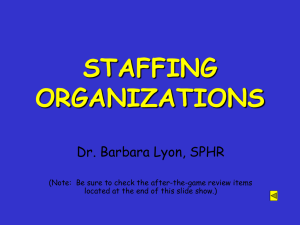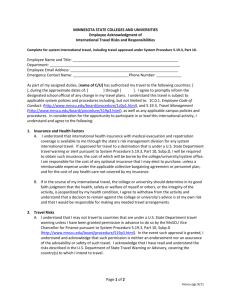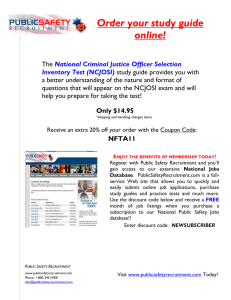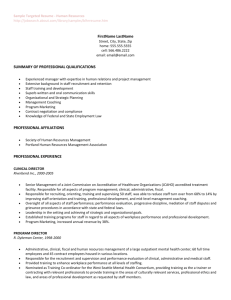International Student Recruitment
advertisement
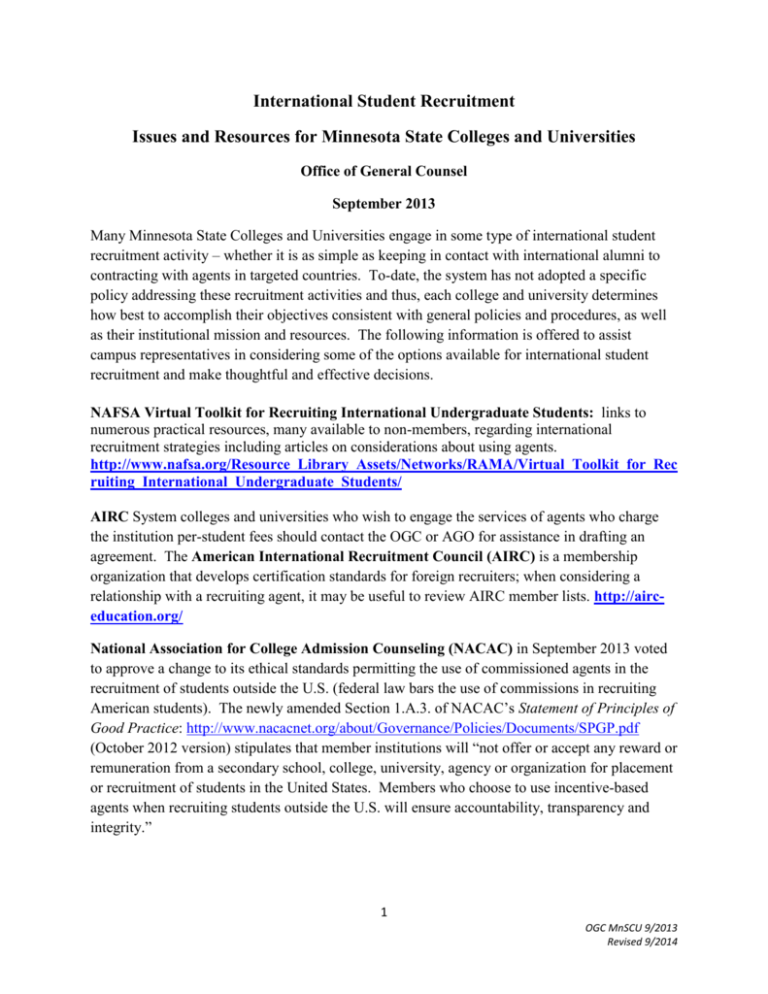
International Student Recruitment Issues and Resources for Minnesota State Colleges and Universities Office of General Counsel September 2013 Many Minnesota State Colleges and Universities engage in some type of international student recruitment activity – whether it is as simple as keeping in contact with international alumni to contracting with agents in targeted countries. To-date, the system has not adopted a specific policy addressing these recruitment activities and thus, each college and university determines how best to accomplish their objectives consistent with general policies and procedures, as well as their institutional mission and resources. The following information is offered to assist campus representatives in considering some of the options available for international student recruitment and make thoughtful and effective decisions. NAFSA Virtual Toolkit for Recruiting International Undergraduate Students: links to numerous practical resources, many available to non-members, regarding international recruitment strategies including articles on considerations about using agents. http://www.nafsa.org/Resource_Library_Assets/Networks/RAMA/Virtual_Toolkit_for_Rec ruiting_International_Undergraduate_Students/ AIRC System colleges and universities who wish to engage the services of agents who charge the institution per-student fees should contact the OGC or AGO for assistance in drafting an agreement. The American International Recruitment Council (AIRC) is a membership organization that develops certification standards for foreign recruiters; when considering a relationship with a recruiting agent, it may be useful to review AIRC member lists. http://airceducation.org/ National Association for College Admission Counseling (NACAC) in September 2013 voted to approve a change to its ethical standards permitting the use of commissioned agents in the recruitment of students outside the U.S. (federal law bars the use of commissions in recruiting American students). The newly amended Section 1.A.3. of NACAC’s Statement of Principles of Good Practice: http://www.nacacnet.org/about/Governance/Policies/Documents/SPGP.pdf (October 2012 version) stipulates that member institutions will “not offer or accept any reward or remuneration from a secondary school, college, university, agency or organization for placement or recruitment of students in the United States. Members who choose to use incentive-based agents when recruiting students outside the U.S. will ensure accountability, transparency and integrity.” 1 OGC MnSCU 9/2013 Revised 9/2014 NEW! NACAC in September 2014 published its Counseling Guide on International Student Recruitment Agencies. NACAC describes risks and concrete steps to ensure accountability when working with foreign recruiters. EducationUSA https://www.educationusa.info/about.php Education USA is a cost-free program of the US Department of State available to assist US institutions of higher education in various ways, including providing objective and comprehensive information about regions of the world in which recruitment is being considered. From its website: EducationUSA is a network of hundreds of advising centers in 170 countries, where millions of international students each year find accurate, comprehensive, and current information about how to apply to accredited U.S. colleges and universities. The EducationUSA network is supported by the U.S. Department of State's Bureau of Educational and Cultural Affairs (ECA), which strives to foster mutual understanding between the people of the United States and the people of other countries. EducationUSA advisers and staff work with U.S. higher education professionals to promote international student enrollment. EducationUSA also helps promote study abroad opportunities for U.S. citizens. U.S. and international students alike can prepare for leadership roles in today's world through an international education. The U.S. higher education community collaborates with EducationUSA to attract qualified international students to U.S. campuses. EducationUSA assists U.S. college and university recruiting and admissions staff by providing information on trends in higher education overseas, foreign education systems, the importance of recruiting international students, how to utilize the network to recruit effectively, and how to maintain an international-student friendly campus and website. The U.S. Department of State funds the annual IIE Open Doors Report, which provides statistics about rates of tertiary international student mobility to and from the United States. Advisers host college and university visits to their centers and at EducationUSA college fairs. More than 1,000 accredited U.S. institutions access a wide range of services and tools for recruitment advice through the EducationUSA website. Study Minnesota is a newly forming nonprofit corporation organized by the U.S. and State of Minnesota Trade Offices; it will be operated in accordance with the IRS tax exempt regulations of Section 501 (c) (6) for “business leagues.” The first official meeting occurred in June 2013. The general purpose of Study Minnesota is to internationally promote educational and training opportunities in the state; it is modeled on similar organizations that have been developed in other states. Study Minnesota is envisioned to complement international marketing and recruitment by member institutions. Promotion is anticipated to be accomplished primarily via a 2 OGC MnSCU 9/2013 Revised 9/2014 common web-site that will include links to institutional member web-sites. Other possible activities may include: Developing joint marketing materials to promote state educational opportunities more generally; Sponsoring foreign educational advisors to visit colleges and universities in person; Participation in state-supported educational missions to foreign countries; Sharing template resources such as international student orientation and programming; Presence at NAFSA conferences (national and regional). Membership is open to all educational organizations within the state, including public and private institutions of higher education. It is expected that annual membership fees will be approximately $350.00. MnSCU colleges and universities interested in exploring membership in Study Minnesota may contact: David Edmiston, US Commercial Service Minnesota david.edmiston@trade.gov 612 348-1644; Tim Odegard, Minnesota Trade Office tim.odegard@state.mn.us 651 259-7491. Campus officials may also contact the following for further information: Todd Harmening, Academic Affairs todd.harmening@so.mnscu.edu 651 201-1856 3 OGC MnSCU 9/2013 Revised 9/2014
